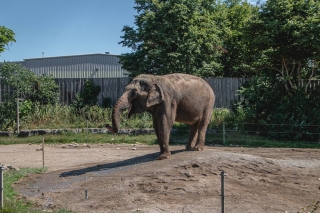Exciting news for captive wildlife! Today, the Canadian government introduced Bill S-15, important legislation aiming to phase out the captivity of elephants and great apes.
The bill is sponsored by Senator Marty Klyne, and incorporates aspects of Bill S-241, also known as The Jane Goodall Act (which is also sponsored by Senator Klyne) and is currently being studied by the Senate, and is broader in scope.
Once passed, Bill S-15 would phase out elephant and great ape captivity by banning zoos and private owners from acquiring new animals or breeding existing ones, and would outlaw the use of these animals in entertainment performances immediately. There would be limited exceptions for animals in need of rescue, or for legitimate conservation programs.
Elephants and great apes are highly intelligent, and social beings with complex natural habitats. Studies have shown that these animals suffer both physically and mentally in captivity, and often develop serious behavioural and health problems due to the stress of confinement.
There are around 30 great apes held in captivity in Canada, a category that includes chimpanzees, gorillas, orangutans, and bonobos. Over 20 captive elephants are held in Canada, including Lucy—the solitary elephant at the Edmonton Zoo who suffers from severe health problems, and many elephants held at African Lion Safari in Ontario, which has a history as an international hub for elephant breeding, performance, and exploitation. Many of these animals were captured from their homes in the wild before being caged for human entertainment.
The new bill builds on Canada’s ban on the captivity of whales and dolphins, which Animal Justice helped pass in 2019. It also fulfills a commitment made by the Liberal government in its 2021 election platform.

Wild Animals Suffer in Captivity
Canada’s legal system does not adequately protect wildlife from suffering in captivity, whether they’re displayed in a zoo or kept in someone’s private residence, and were obtained through the exotic pet trade.
There are no federal laws regulating zoos, and provinces have a patchwork of legislation, with no zoo regulation whatsoever in Ontario. This has allowed roadside zoos with poor standards to proliferate in many parts of the country. In 2022, Animal Justice released shocking footage from the largest-ever zoo exposé in Canada, investigating nearly every zoo in Ontario. We uncovered widespread suffering and troubling conditions in these facilities. Animals were seen pacing back and forth in mental distress, many had physical health problems and were kept in small, shoddy cages.
Wild animals desperately need protection from a life of misery behind bars in Ontario, and across the country.
While we applaud the government on this important step, we will continue to support the Jane Goodall Act at the same time, which would protect over 800 species from being confined in roadside zoos or kept as pets. Add your voice today to help ensure the new bill is passed into law as soon as possible.
